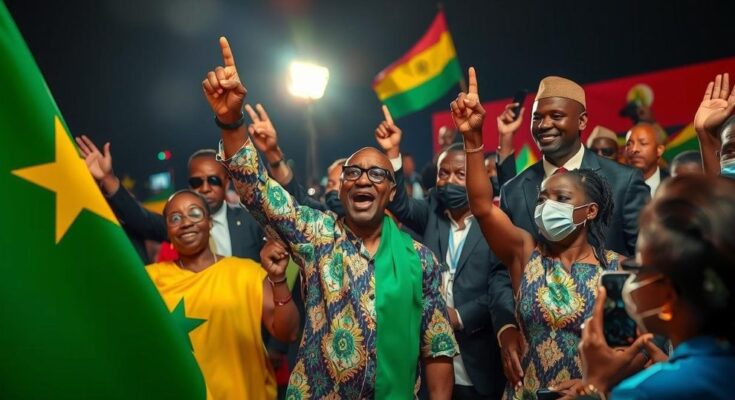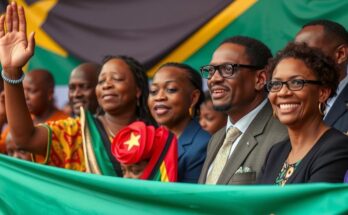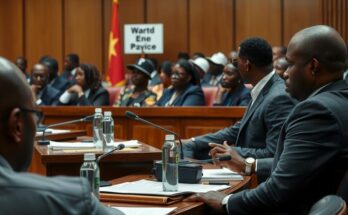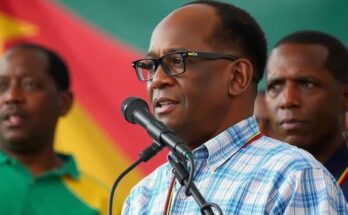Senegal’s ruling party, PASTEF, has claimed a significant victory in the legislative elections, promoting President Bassirou Diomaye Faye’s reform agenda. The two main opposition parties conceded defeat, while former President Macky Sall alleged fraud without evidence. Faye, who faced a potentially obstructive legislature previously, anticipates enhanced capacity to implement reforms. Economic concerns, including high unemployment and a revised budget deficit, loom large as the new government begins its term.
Senegal’s ruling party, PASTEF, has declared a decisive victory in the recent legislative elections held on Sunday, November 17, 2024, with nearly all ballots accounted. This triumph follows President Bassirou Diomaye Faye’s win in the presidential elections earlier this year, enabling him to pursue an ambitious reform agenda. Local outlets suggest that PASTEF achieved a strong showing in most polling stations, with government spokesperson Amadou Moustapha Ndieck Sarre acknowledging the electorate’s support for their party. Despite ongoing vote counting, the two primary opposition factions conceded their loss. Barthelemy Dias, leader of the SAMM Sa Kaddu coalition, offered his congratulations to PASTEF, acknowledging the latter’s electoral success. In contrast, former President Macky Sall, who heads an overseas opposition group, alleged that the election was tainted by significant fraud, although he did not substantiate these claims with details. Following his inauguration in April, President Faye has expressed his intention to implement reforms; however, his efforts were previously hindered without a parliamentary majority, as PASTEF only held a fraction of the seats. Faye’s pledge to confront corruption and improve the management of natural resources has faced challenges due to opposition resistance. Following a strong presidential election performance where he secured 54% in the first round, the legislative elections were anticipated to benefit PASTEF under Prime Minister Ousmane Sonko’s leadership. The opposition, led by former President Sall, has historically refrained from engaging in political activities post-presidency; however, Sall’s recent actions—including protests against legal challenges faced by Faye and Sonko—have stirred unrest. The campaign period was marked by sporadic incidents of violence but remained largely peaceful despite tensions between competing factions. The opposition has criticized the new administration for its perceived inaction and for appearing preoccupied with vendettas against the preceding government. Amid burgeoning unemployment, which exceeds 20%, many citizens are seeking perilous routes to Europe. Additionally, the government has disclosed that the budget deficit is larger than previously reported, leading to the suspension of an International Monetary Fund (IMF) aid program. Authorities have initiated measures to lower the prices of essential commodities to honor electoral pledges, a move that could place additional strain on the national budget.
The legislative elections in Senegal represent a crucial moment for the ruling party, PASTEF, under President Bassirou Diomaye Faye, who was elected earlier this year and seeks to advance a reform agenda following significant victories. The conditions surrounding this election are shaped by a mix of political tensions, opposition challenges, and economic hurdles, such as high unemployment rates and government debt issues. The outcome will heavily influence Senegal’s legislative landscape and its capacity to implement intended reforms in governance and economic management. Moreover, past allegations of electoral fraud are pertinent to this context, reflecting the lingering divisions within the country’s political system.
The recent legislative elections in Senegal have resulted in a significant gain for the ruling party, PASTEF, while opposition factions have acknowledged their defeat. President Bassirou Diomaye Faye’s leadership appears set to move forward with a reform agenda, bolstered by a parliamentary majority. Nonetheless, challenges persist, including allegations of electoral misconduct, ongoing economic difficulties, and public dissatisfaction regarding unemployment and resource management. These dynamics will play a pivotal role in shaping Senegal’s future political and economic landscape.
Original Source: www.dw.com




